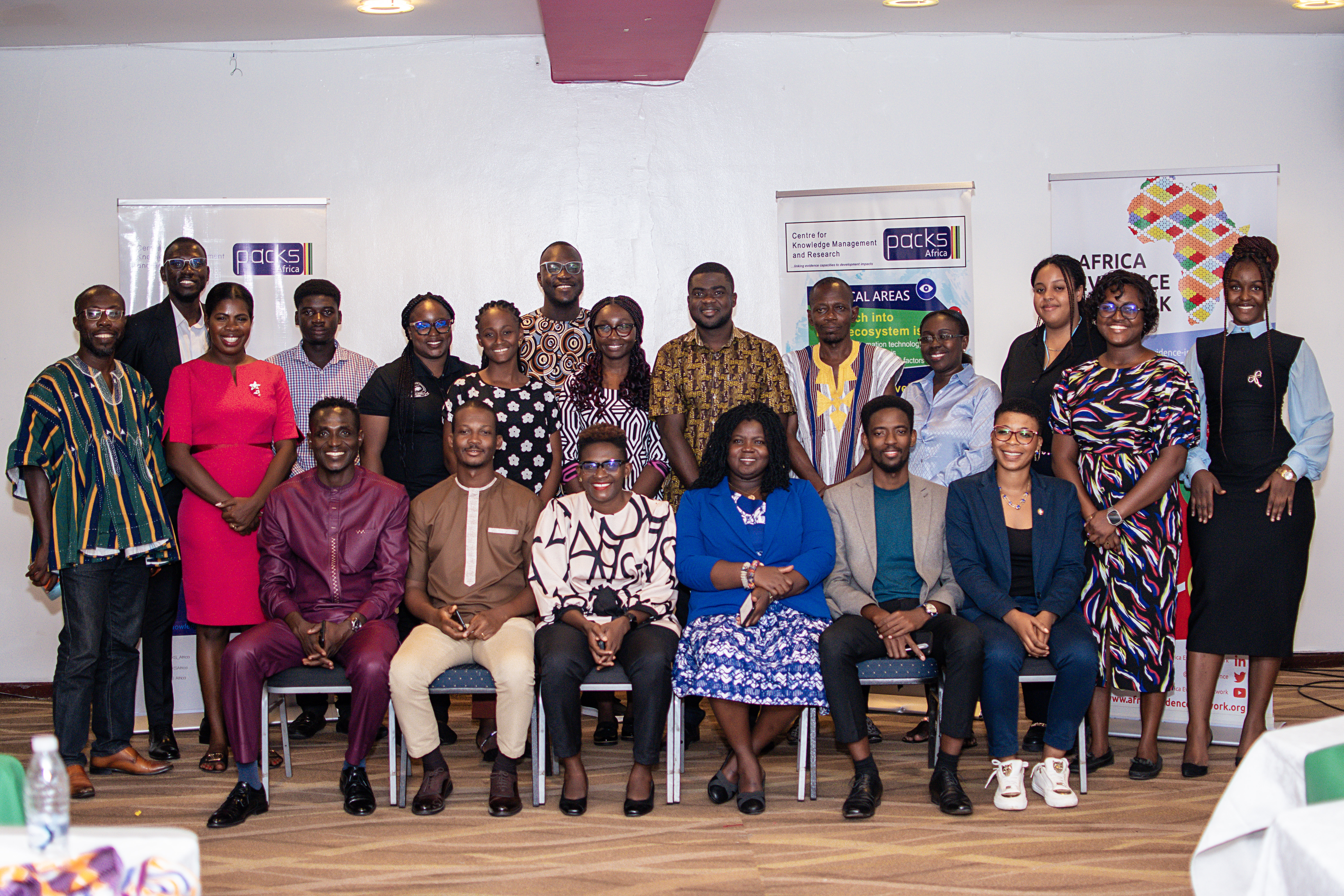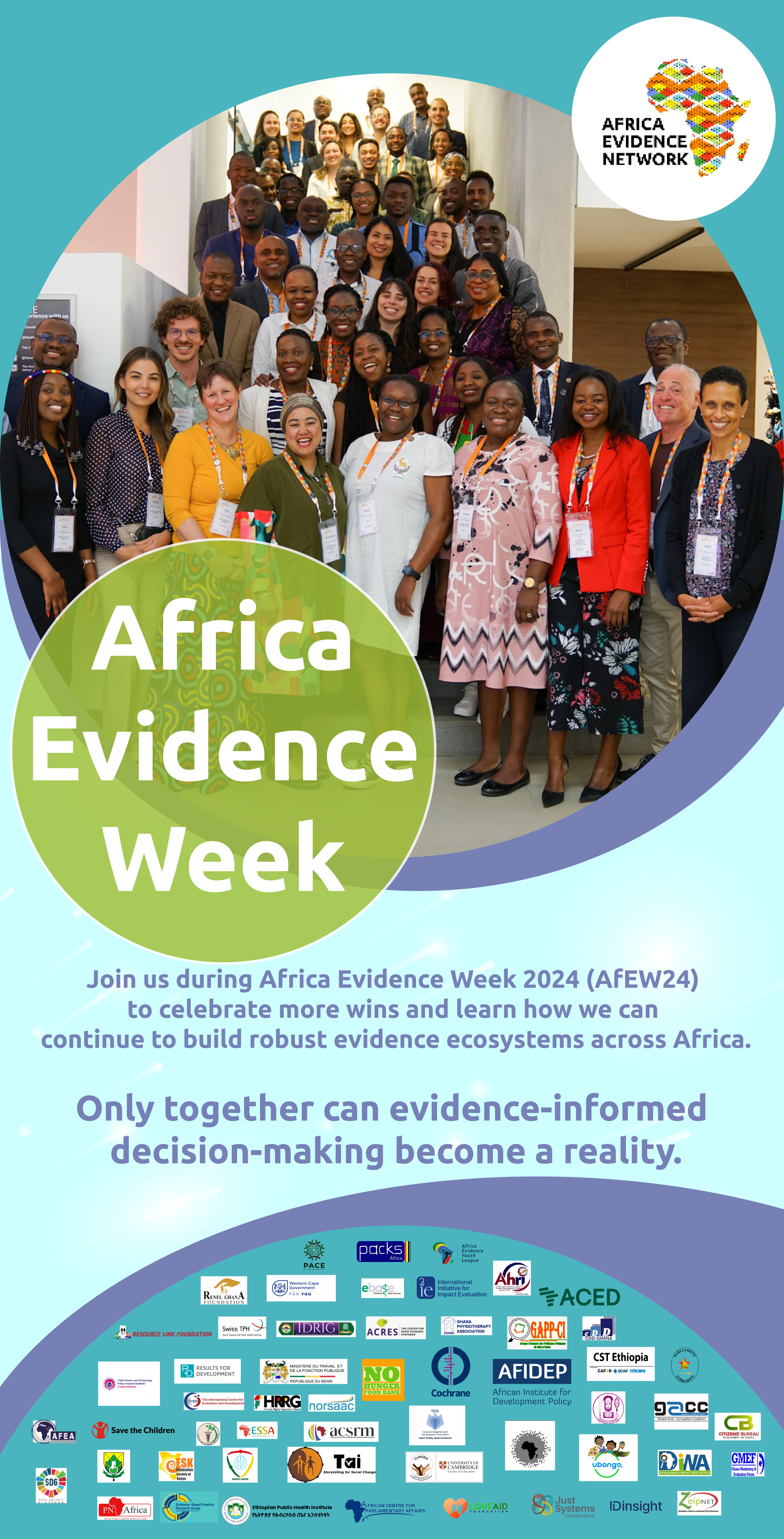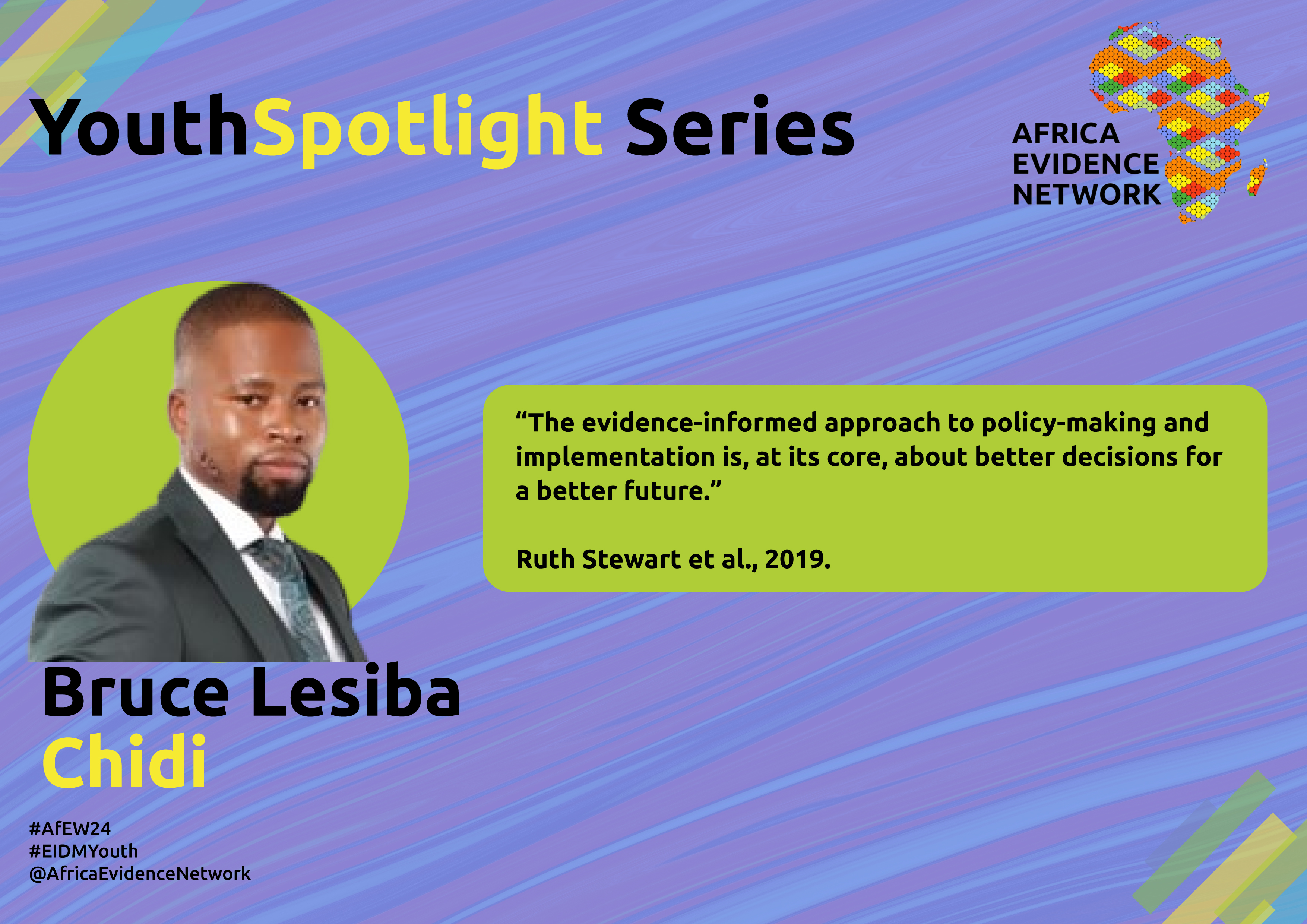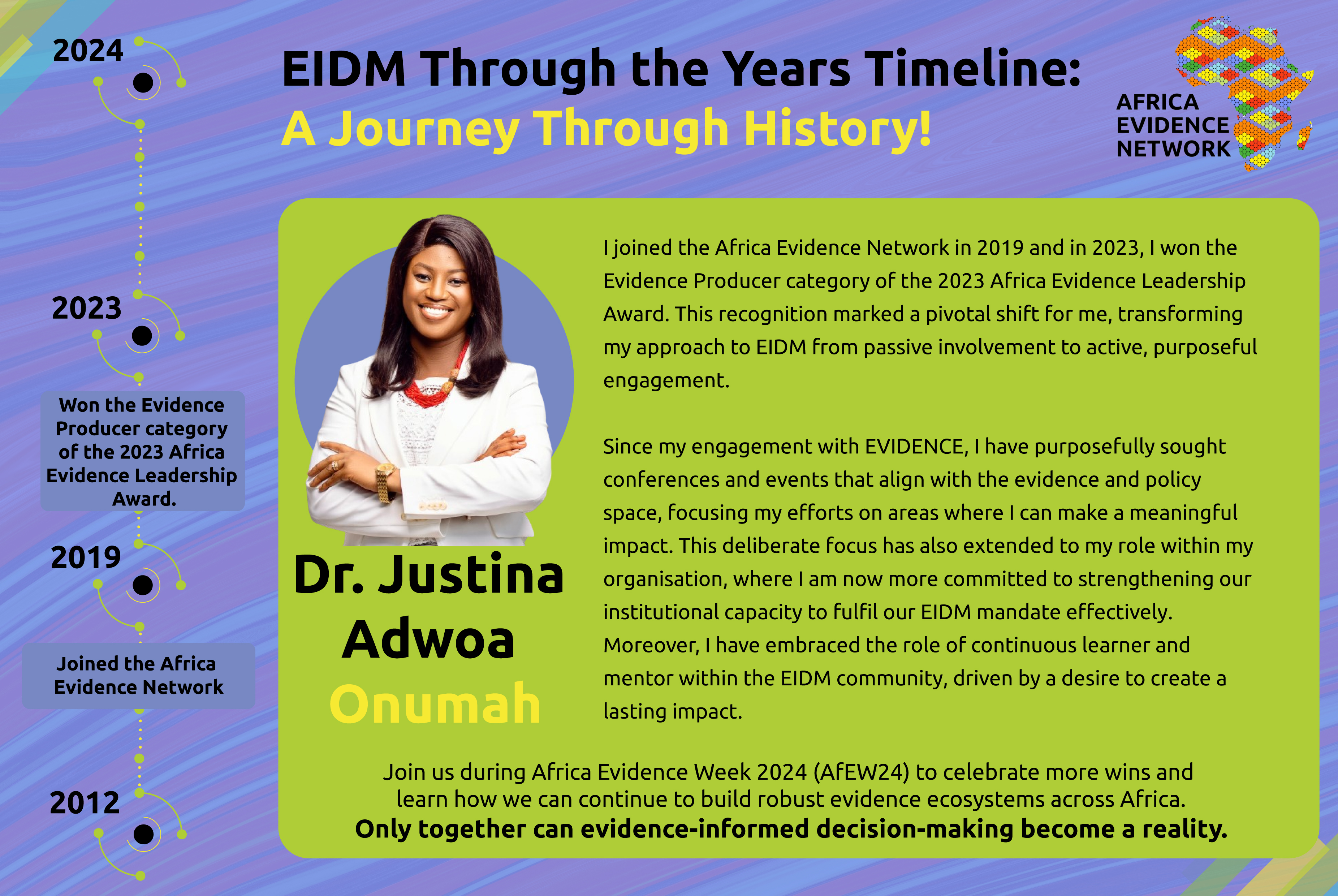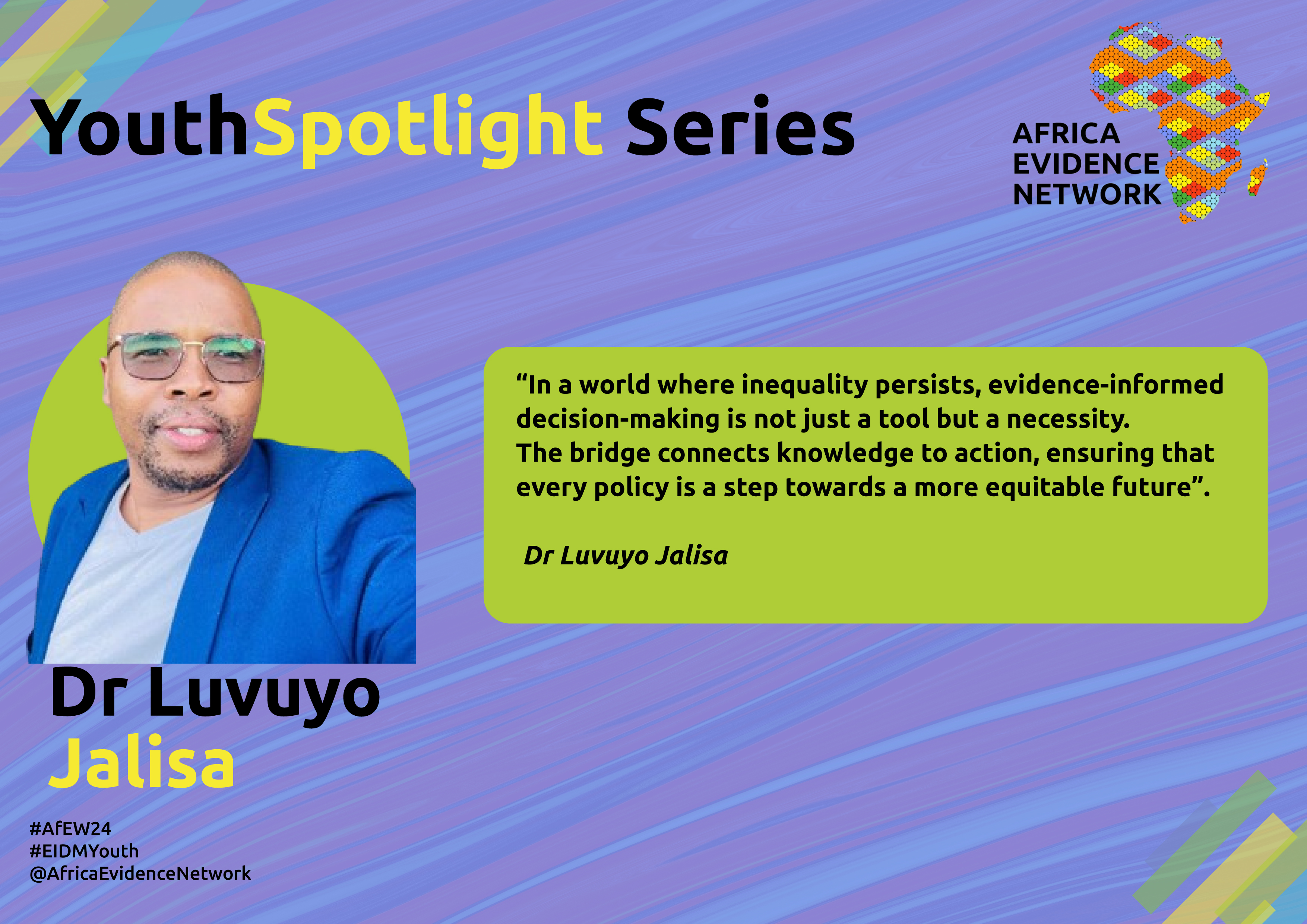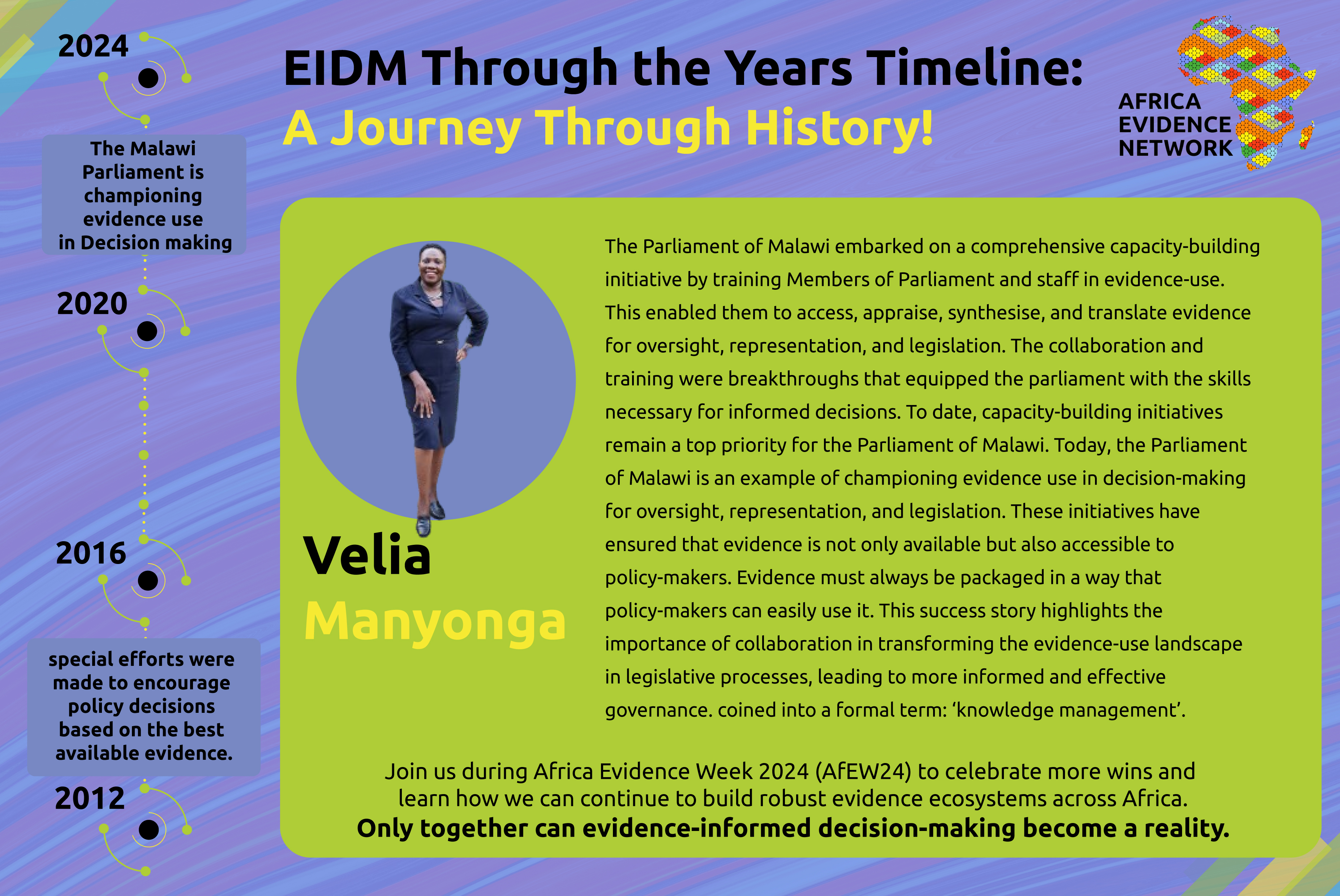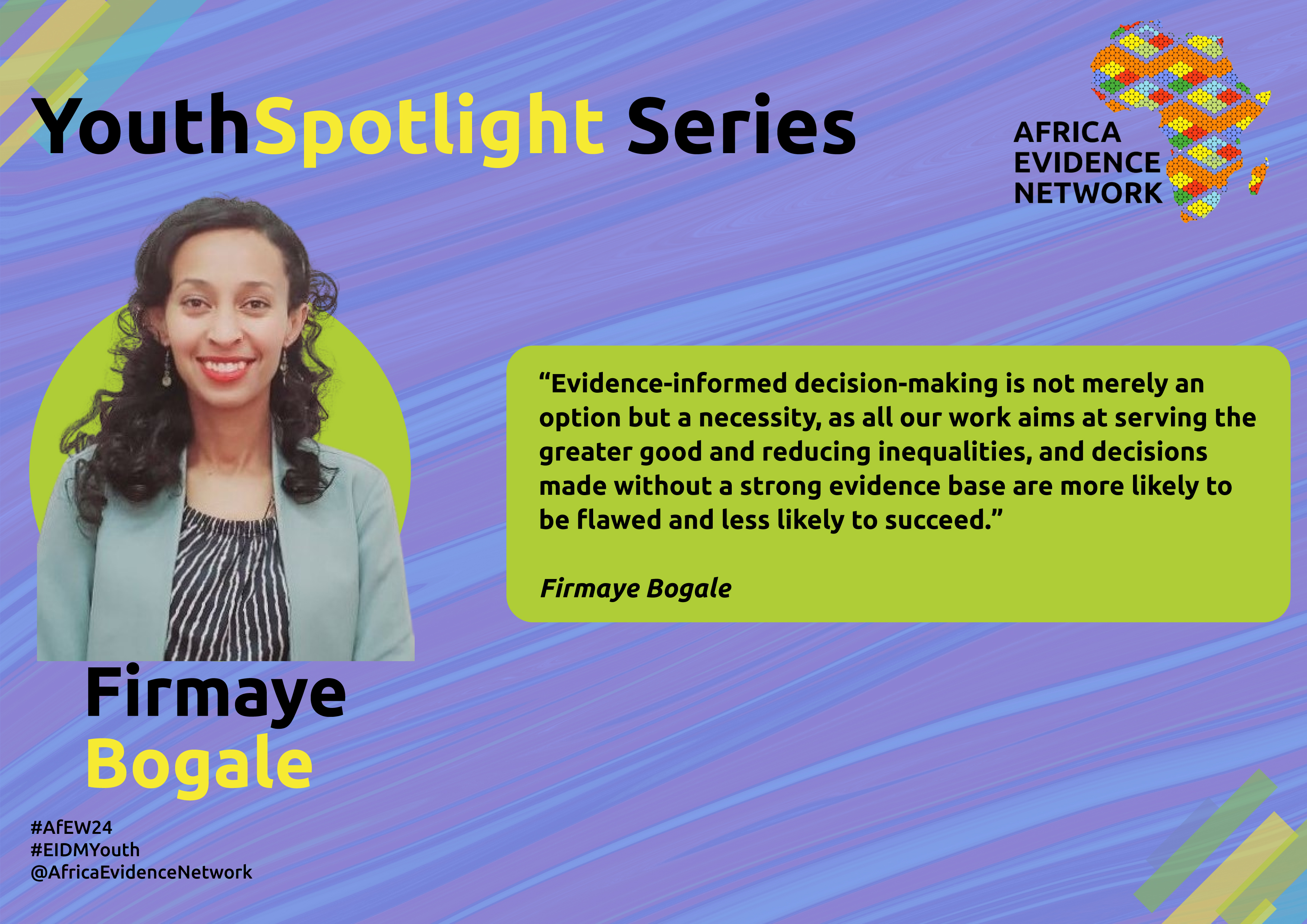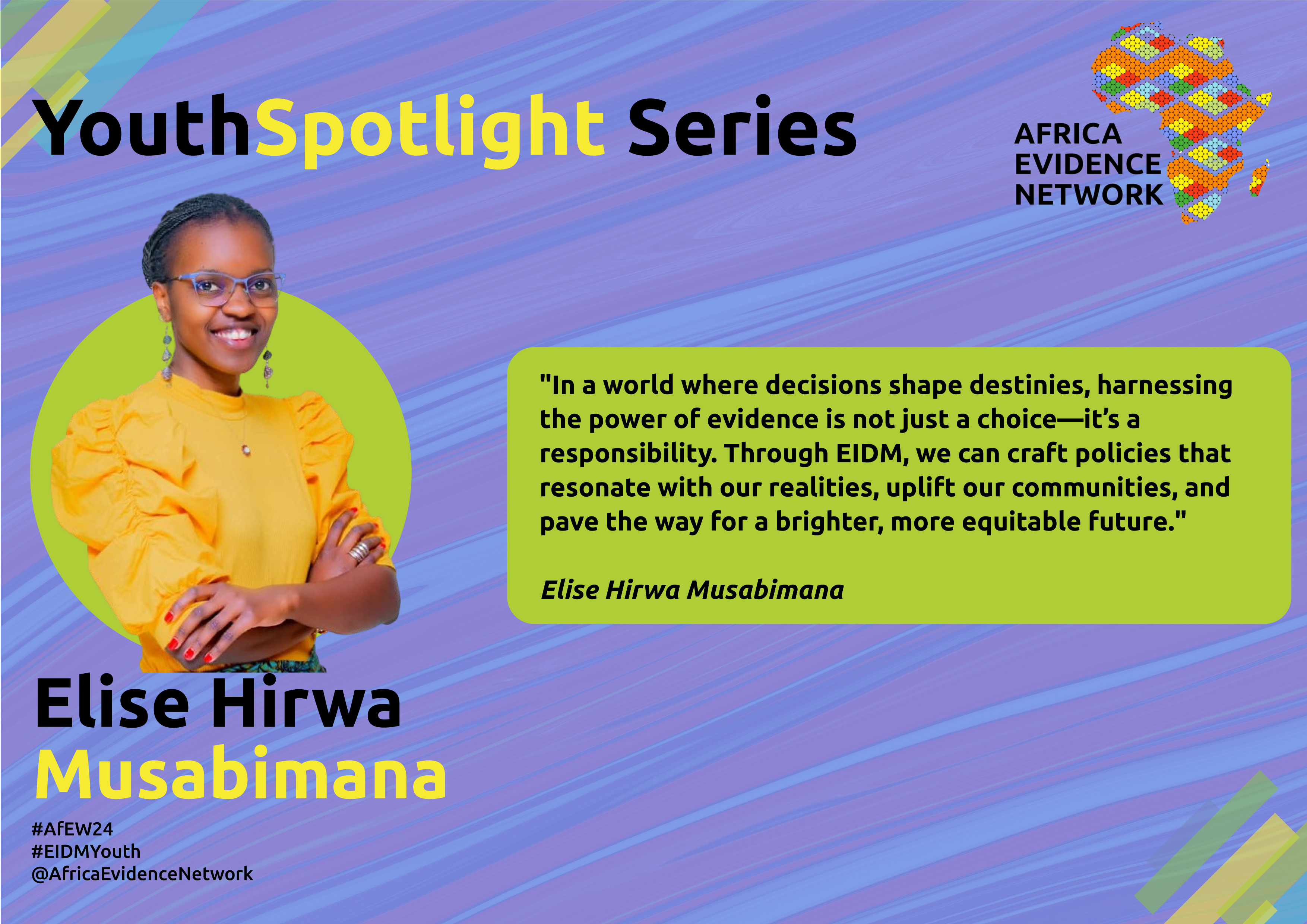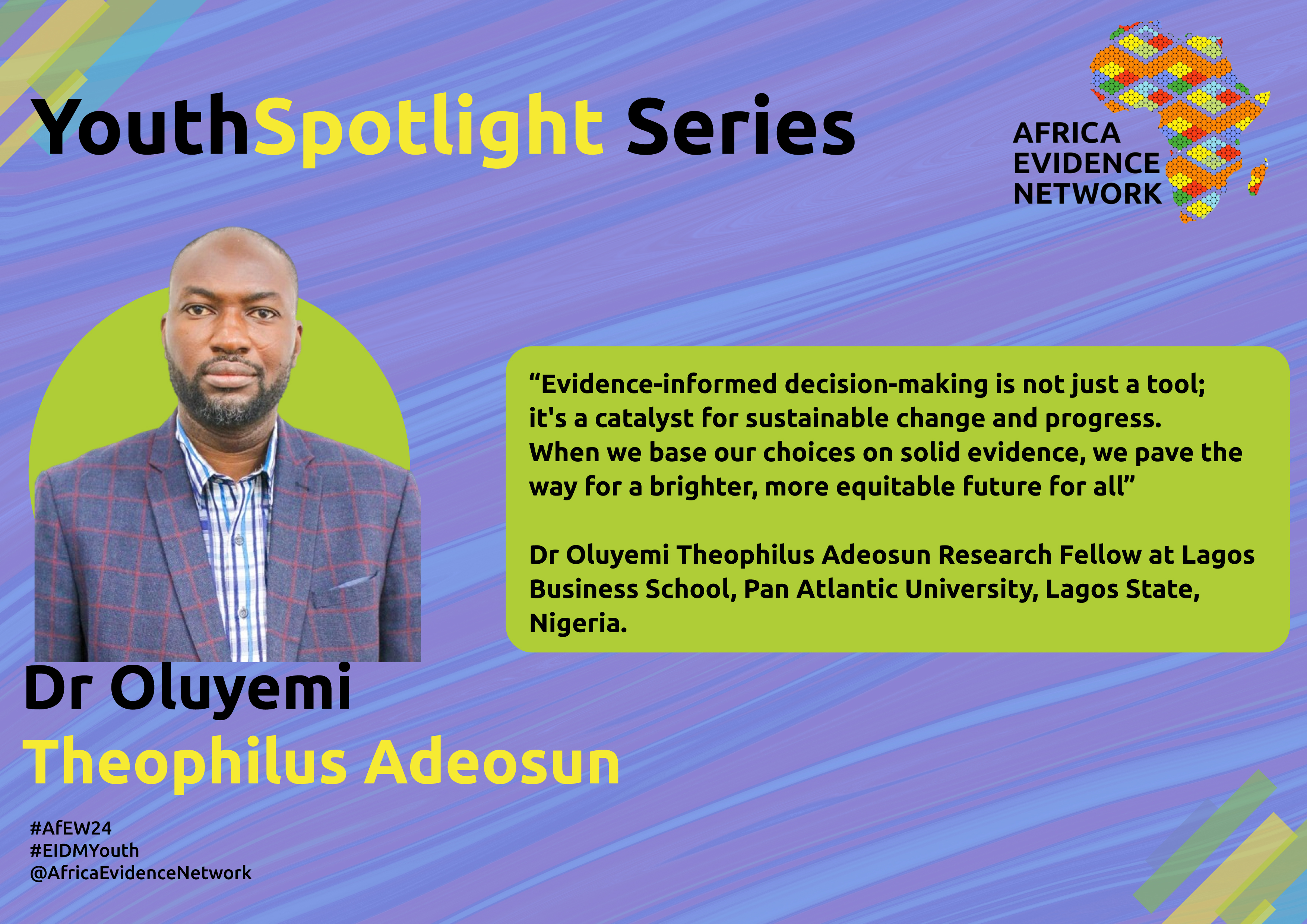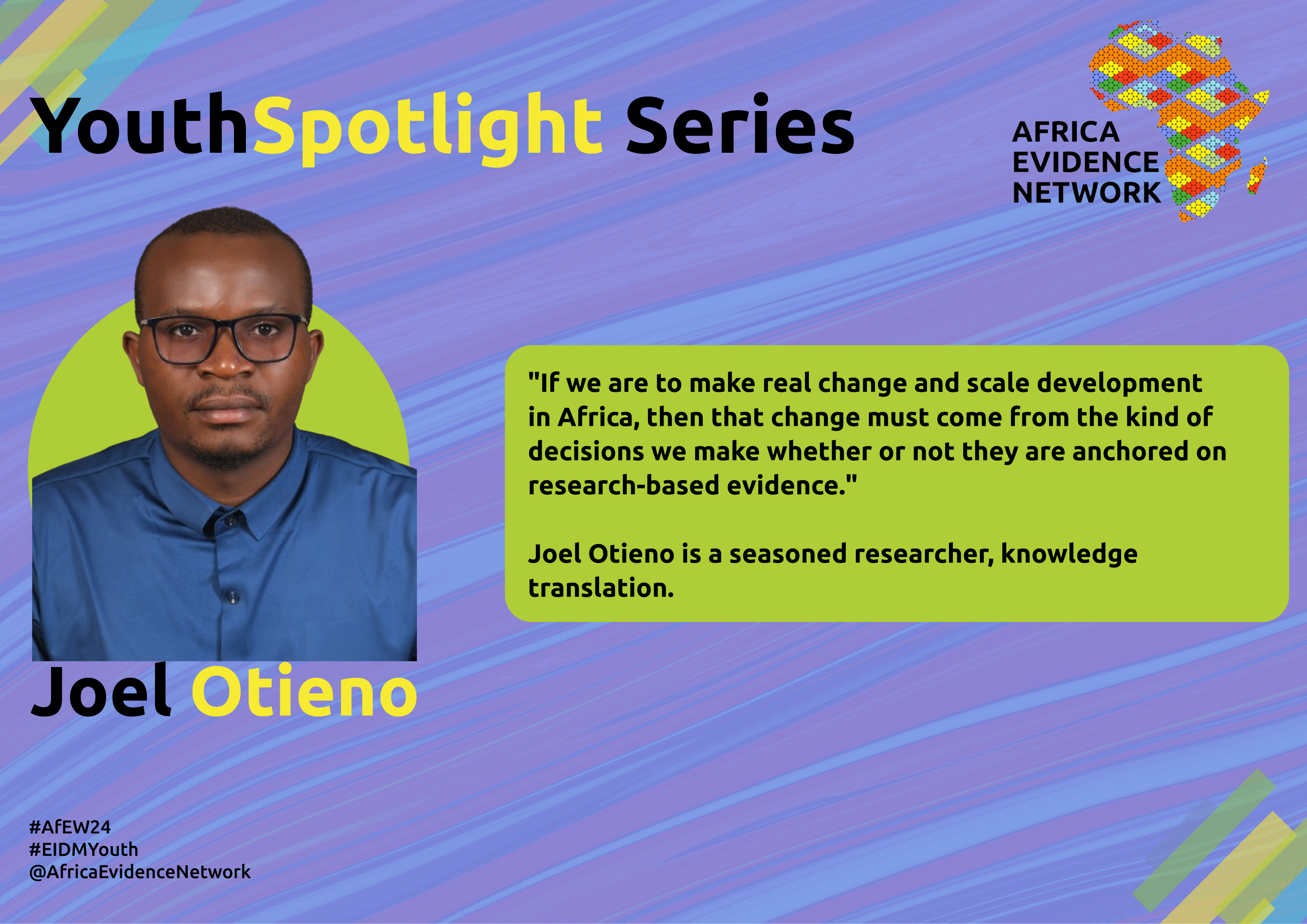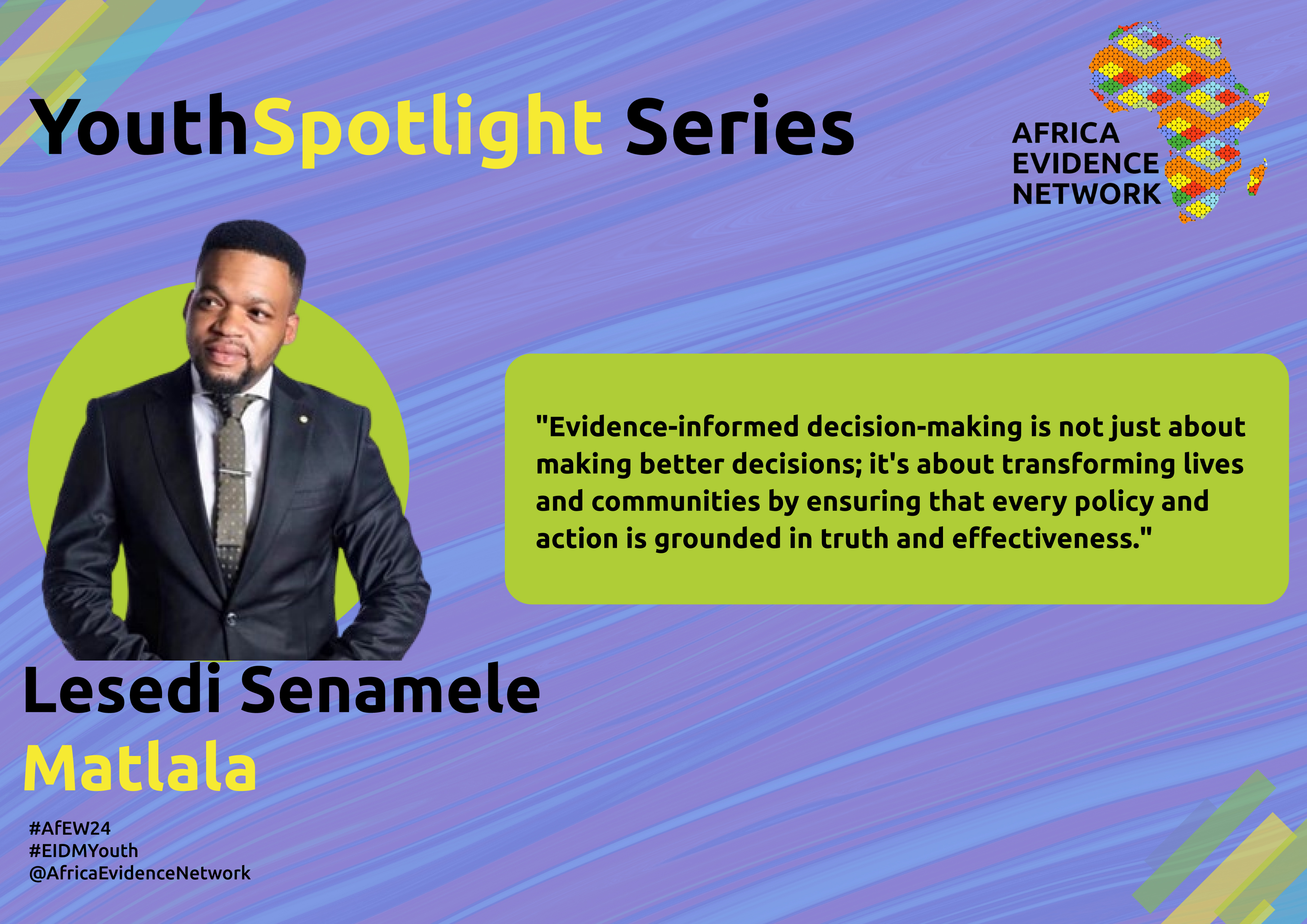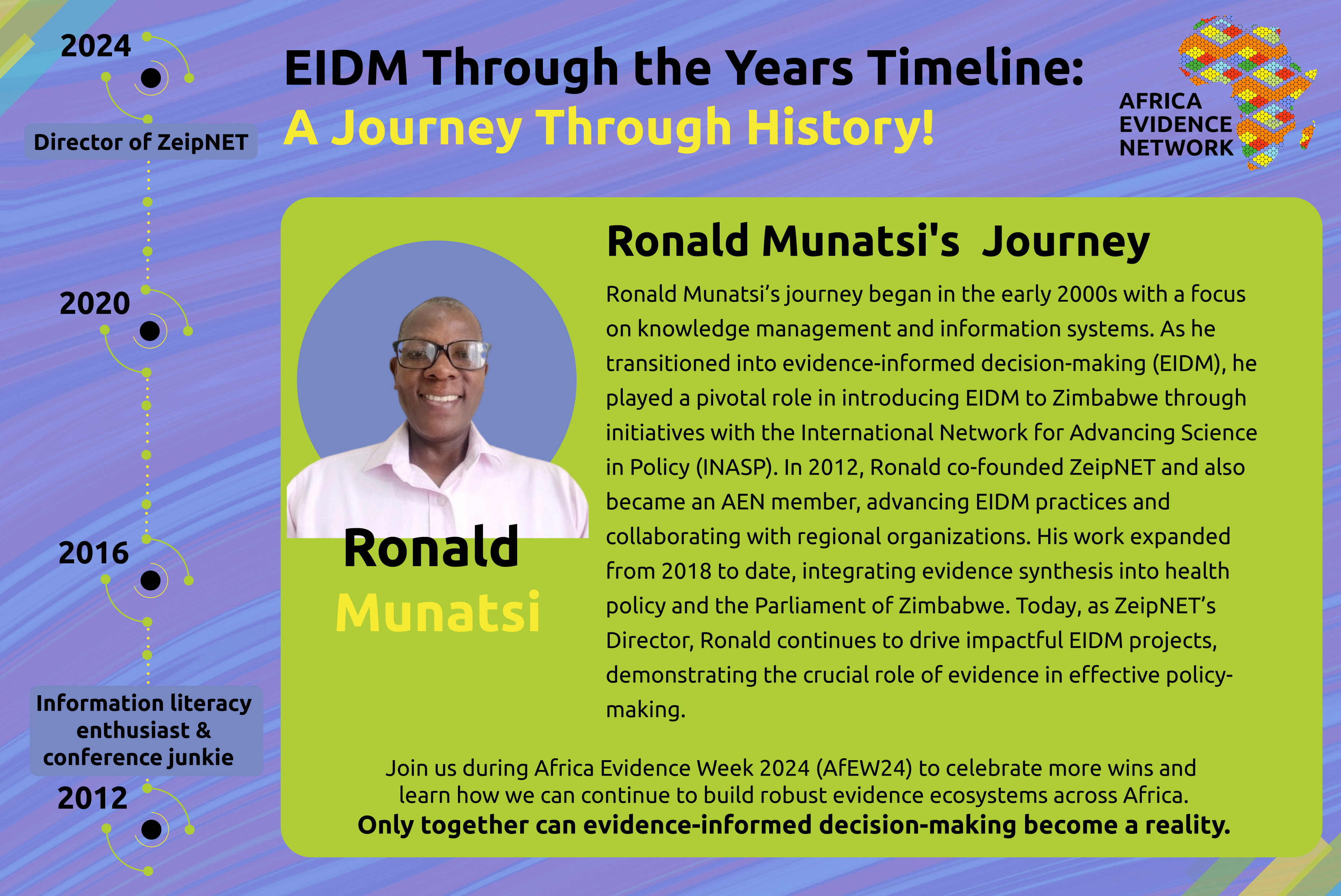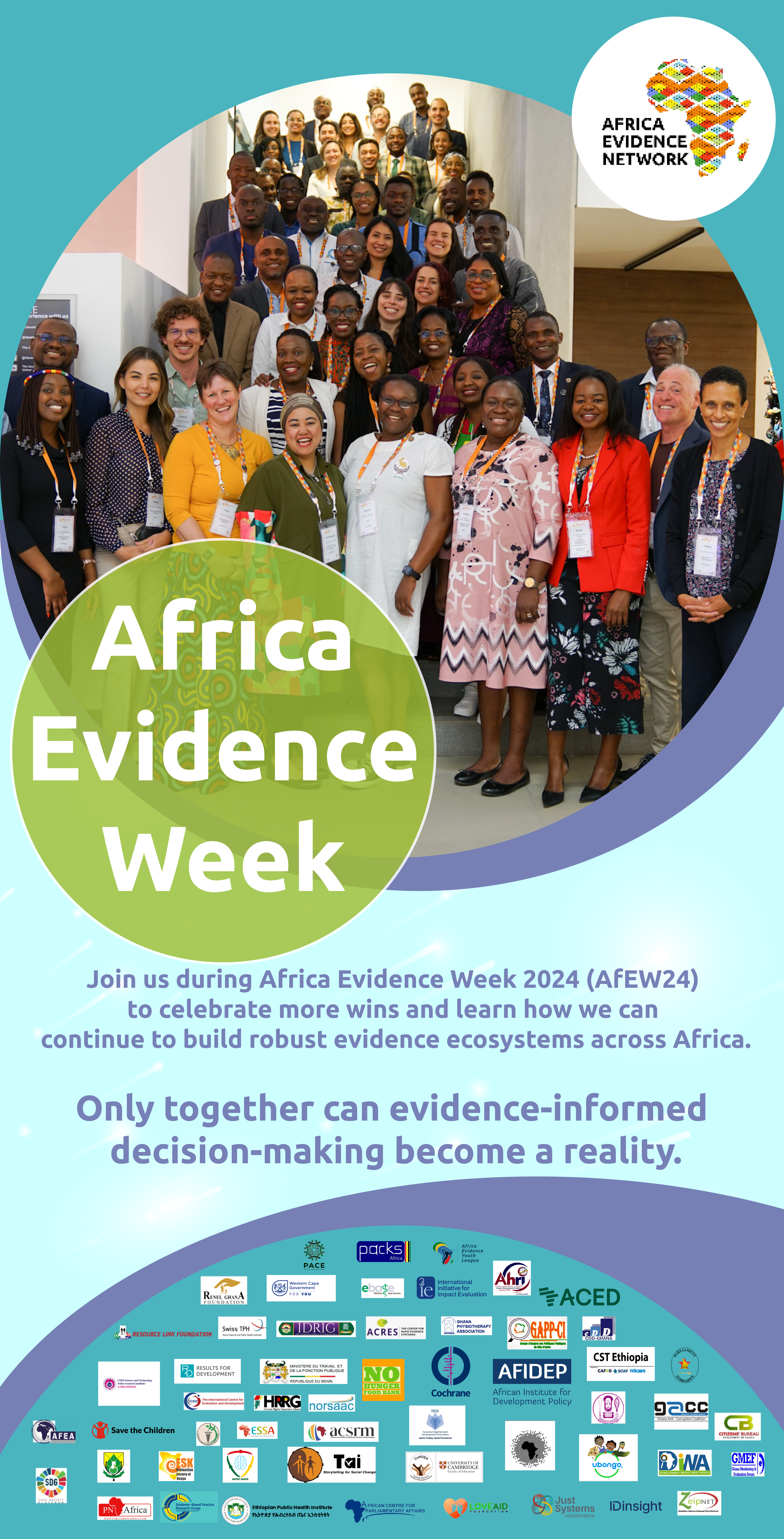
I cannot believe that day two has come and gone. The programme showcased various activities that were aligned with the event’s objective, which is to showcase and promote the state of evidence-informed decision-making on the continent, specifically highlighting the contribution of young and emerging leaders in African EIDM. Day two’s programme was filled with various activities, including six Twitter chats, six videos, four blog posts, a publication, an EIDM story and two live webinars. In the next few days, the Africa Evidence Network (AEN) will use a Twitter thread to spotlight amazing organisations and participants from across the continent showcasing their innovative approaches to EIDM. Andile Madonsela introduced and welcomed participants to the AEN Innovations Series and five innovations were showcased today.
We published four blogs:
- In reflecting back, the day started with a blog from Siziwe Ngcwabe and Charity Chisoro of the Africa Evidence Network which captured some highlights from the preceding day of Africa Evidence Week and flagged what’s coming up in the day ahead for participants.
- In this blog, the authors outline four highlights we should know about Africa Learning Together to Advance Evidence and Equity in Policymaking to Achieve the Sustainable Development Goals (Africa LEEPS) Partnership.
- Siziwe highlights that the Africa Evidence Network (AEN) has established several communities of practice (CoPs) to advance its work in 2023. The CoPs will serve as tools to enhance evidence capacities and collaboration in Africa. She mentions that this is a wonderful opportunity for mentorships within the CoPs, where individuals can learn from each other. The purpose of the CoPs is to enhance capacities and foster collaborations in the evidence-informed decision-making (EIDM) sector in Africa.
- We shared a blog post from 3ie authored by Bio Bertrand Mama, an Evaluation Specialist and co-authored by Anca Dumitrescu, Lead Evaluation Specialist; Charlotte Lane, Evaluation and Learning Consultant, Food Security Evidence Brokerage and Binta Ndiaye, Research Assistant. The blog focuses on the opportunities and challenges of micro-health insurance and digitisation for vulnerable African populations. It is on the lessons from the Innovation for the Health of People in Vulnerable Situations in Africa (ISPV-Africa) project in Togo, which is an innovation which aims to make access to health insurance possible for the greatest number of vulnerable people by guaranteeing them a set of varied and quality services such as payment of membership and contributions online, medical facilitation at the health centre, home visits for monitoring and health advice.
We had two live webinars:
- The live was titled “Time to Talk Data’ platform on how to develop and use Evidence Maps.” The Provincial Data Office (PDO) in the Department of the Premier is actively creating pathways in the Western Cape Government to become a data-driven organisation. Over the years the PDO has institutionalised data governance at a sub-national level and most recently adopted a Data Governance Policy Framework. As part of this work, a series of Data Governance Practice Notes are at different stages of development. This is done to direct, enable and guide on data and evidence practices that should be embedded in its strategic and operational business. One of these Practice Notes is on ‘How to develop and use evidence maps. This was a great opportunity for learning and building partnerships. Over 115 data and evidence stakeholders, including Provincial departments, National departments, Municipalities, Academia, Agencies and related content specialists, attended the webinar and had rich conversations and engagements.
- The second live webinar was entitled “Delivering Impactful Systematic Review Training Programs: Insights from Our Evaluation of Challenges, Successes, and Future Directions.” The African Community for Systematic Reviews and Meta-analyses (ACSRM) had an engaging webinar as they delved into an evaluation of the African Community for Systematic Reviews and Meta-analysis (ACSRM) training programmes. The webinar featured a dynamic panel discussion with experts who provided their insights on the evaluation findings and shared best practices in capacity building. Interactive polls and a Q&A session allowed the over 140 participants to engage actively and share their experiences. This was an opportunity to gain valuable insights and contribute to the conversation on advancing evidence synthesis training in Africa.
Six Twitter chats:
- EIDM INNOVATION IN AFRICA #6 | EIDM Advocates: How do we begin to measure the impact of our work | Videos | Africa Evidence Network. The project aimed to understand what measurements are used to assess the impact of initiatives to support EIDM. Available evidence was collated on how to measure the impact of EIDM initiatives, and the evidence base was mapped.
- EIDM INNOVATION IN AFRICA #7 | Fostering #EvidenceInfromedlives: the AEN podcast | Videos | Africa Evidence Network this innovation by the AEN – the podcast. The aim of this podcast is to cast a light on the African evidence ecosystem, with a specific focus on the history, progress, pitfalls, and the future.
- EIDM INNOVATION IN AFRICA #8 | The future of EIDM: Africa Evidence Youth League | Videos | Africa Evidence Network this innovation by the AEN – the Africa Evidence Youth League (AEYL) which brings together emerging leaders and provides a platform for them to share ideas, build connections, and take part in mentoring, career- and institution-building activities.
- EIDM INNOVATION IN AFRICA #9 | Accessibility and use of evidence at the decentralized level in the era of the digital revolution | Videos | Africa Evidence Network this innovation. L'utilisation de données probantes dans la conception et la gestion des politiques publiques est essentielle pour leur pertinence, leur efficacité et la durabilité de leurs impacts. A cet effet, la transformation digitale, qui se distingue de la digitalisation des procédures, se présente comme une opportunité à promouvoir. En effet, une telle transformation des cultures et manière de faire pourraient totalement changer la place les données probantes dans la formulation et la mise en œuvre des politiques publiques en Afrique, et plus particulièrement en Afrique francophone. Mais pour saisir cette opportunité, il faudra notamment l’amélioration de l’environnement institutionnel et opérationnel, le renforcement des capacités techniques des ressources humaines, l’investissement dans des infrastructures requises, la promotion de partenariats entre les acteurs locaux et nationaux, le partenariat public-privé, etc. Cette présentation, issue d’une recherche de l’institut Le Barometre, nous montre l’état des lieux en Afrique avec le Bénin comme étude de cas.
- EIDM INNOVATION IN AFRICA #10 | Monitoring and Evaluation of SDGs digital solutions at Municipality level: Case of the Barometer app | Videos | Africa Evidence Network this innovation. L’Institut Africain appelé « Le Barometre » promeut le développement de solutions numériques pertinentes pour la production, l’accessibilité et l’utilisation des données probantes nécessaires pour la formulation et la mise en œuvre des politiques publiques, des programmes et projets de développement. En 2022, l’institut a conçu une solution numérique appelé Barometre-ODD, qui permet de suivre la dynamique des ODD dans toutes les communes du monde à la fois et cela en temps réel. Cette innovation a été distinguée comme 2e meilleure innovation au monde dans le cadre du programme Launchpad de la Global Evaluation Initiative (GEI) de la Banque Mondiale. Le Barometre des Communes génère des données probantes dynamiques sur tous les indicateurs qui intéressent les acteurs d’une commune et cela en temps réel pour aider au bien-être des populations.
- Twitter chat: Considerations for safe disposal of garbage in cities and towns, Center for Rapid Evidence Synthesis (ACRES) Shared insights and solutions with experts and policymakers on the topic of Safe Garbage Disposal in Cities & Towns using #AFEW2024chat, #EvidenceCheckACRES
- The landfill in Kiteezi has been stretched to capacity despite only receiving 40-50% of generated waste. This shows there is a need for more capacity in order to achieve Kampala Capital City Authority’s (KCCA) strategic goal of handling 85% of generated waste by 2025.
- Refuse skips and collection points are located far away from the residents. This makes it inefficient for them to dump their waste in the correct way and they end up resorting to nearby dump sites that majority of the time are not official.
- A study done by Makerere University and Kampala Capital City Authority’s (KCCA) identified a lack of awareness among the population, especially those living in the slum areas on proper waste management. Respondents reported that they lacked awareness on how to segregate their waste
- Kampala city has a population of circa 4m people by day and 2m city dwellers by night. A study done in 2014 found that 88% of the waste collected during the wet seasons was organic.
- According to the Kampala Solid Waste Management Ordinance (2000), Kampala Capital City Authority’s (KCCA) has the mandate to contract services of private parties to invest and undertake business operations along the waste management chain.
- Thread: Status of garbage collection in other cities and towns in Uganda Garbage is a challenge in the newly created cities. Uncollected garbage is common on the streets, in the corridors of buildings, and clogs drainage whenever it rains.
- Despite the expansion of their boundaries, the cities are yet to come up with proper garbage management plans and the situation has now worsened with the increase in population sizes.
We published six videos:
- In this video, Peter Kasadha, a research associate at ACRES, shares how the evidence-informed decision-making (EIDM) space is evolving and how knowledge practitioners need to adapt to meet the changing demands. While technical competencies are essential, the ACRES training program recognises the critical importance of collaborative and cultural competencies in shaping the EIDM landscape. The ACRES program is designed to equip knowledge practitioners with the skills to effectively engage stakeholders, build relationships, and navigate the policy environment. By emphasising collaborative and cultural competencies, ACRES aims to revolutionise the EIDM space, enabling knowledge practitioners to drive equitable social and health outcomes.
“Africa Evidence Network, thank you for believing in young men and women. I'm truly excited about the transformative energy and innovative ideas flowing into making Evidence-Informed Decision Making (EIDM) sustainable. This is a pivotal moment where the EIDM space is evolving rapidly, and we, as knowledge practitioners, are actively driving this change. It's not just about adapting to the new landscape; it's about leading the charge to ensure that young leaders and emerging leaders like myself, Andile Madonsela, Elise Hirwa, Talitha Mpando and countless others are not only included but empowered to contribute meaningfully. Together, we can create a lasting legacy that uplifts not just this generation but those yet to come. Let's rise as a village and continue to build a future where evidence truly drives impact! The Center for Rapid Evidence Synthesis (ACRES), thanks you for the efforts, Ismael Kawooya, Rhona Mijumbi, and the rest of the team” Peter Kasadha.
- The African Education Research Database was developed by the Research for Equitable Access and Learning (REAL) Centre, Faculty of Education, University of Cambridge, in partnership with Education Sub Saharan Africa (ESSA).
- Pastan Lusiba talks about using digital tools in evidence-informed decision-making processes from The Center for Rapid Evidence Synthesis (ACRES), Digital transformation of evidence-informed decision-making: enhancing gender-inclusive approaches (youtube.com)
- Listen to Dr. Catherine Kyobutungi, the Executive Director of the African Population and Health Research Center (APHRC), talking about Africa Research Connect (ARC), a ground-breaking web-based platform poised to transform research collaboration in Africa. It was developed by the African Population and Health Research Center (APHRC)’s Catalyze Impact Initiative. ARC serves as a comprehensive database and networking tool, bridging the gap between African researchers, universities, research institutions, and funder.
- Sherry Ahirirwe, a research scientist at ACRES, talks about the development of a national health research agenda in Uganda that has traditionally relied on expert opinion and disease burden. However, this approach has limitations. To address this, ACRES is leading an effort to create an evidence gap map of all health research conducted in Uganda between 2010 and 2022. This map will inform the revision of the 2010 Health Research Agenda in collaboration with the Uganda National Health Research Organisation and the Ministry of Health. This map will guide the next phase of priority setting, involving stakeholder engagement through an online survey, Delphi exercises, and a physical meeting. ACRES aims to update the evidence gap map periodically, making it publicly available to guide research and access to evidence.
- As part of the Africa Evidence Week 2024 celebrations, listen to Andile Madonsela, Managing Researcher and Gender & Evidence Lead at the Pan-African Collective for Evidence (PACE) talking about the development of a CHAT EIDM tool, evidence-use and the GBV pus femicide statistics in South Africa.
Publication: Through a training programme, St. Francis Xavier Hospital successfully implemented an evidence-based project in quality improvement, which is being shared during this event, which is a great opportunity to contribute to the network and learn from the experiences of others.
EIDM stories: The Ethiopian Public Health Institute (EPHI) Knowledge Translation team shares their story of Evidence-Informed Decision-Making, which goes back to 2009. They mention that their journey has been transformative and impactful over the past fifteen years. "As we continue to build capacity and strengthen networks, our vision remains clear: to embed EIDM within the health system and other development sectors in Ethiopia and beyond, ensuring that high-quality research evidence informs policy and practice for a better future."
Tomorrow, we will have three live online events that you don’t want to miss out on! The programme is full of numerous activities including eight blog posts on EIDM-related content that are worth reading, four Twitter chats on a range of EIDM innovations, four interesting videos that you will enjoy watching and listening to, and a publication which looks at the evaluation of quality of science, technology and innovation advice. Join us so that you engage with the content. We believe that “only together can evidence-informed decision-making become a reality!”
About the author: Siziwe Ngcwabe is the Director and Co-chair of the Africa Evidence Network. She is a South African inspirational trailblazing social entrepreneur, motivational speaker, personal change catalyst, and academic. She was born in Qitsi village, Cofimvaba, Eastern Cape, and raised in East Driefontein mine in Carletonville. She holds a Bachelor’s degree in social work with honours from the Walter Sisulu University (UNITRA), a Postgraduate Diploma in Business Management (PGDBM) from MANCOSA, a Master’s degree in Public Management-MPM and Masters of Business Administration-MBA from Regenesys Business School. She worked at several organisations across different sectors in South Africa. Siziwe Ngcwabe is currently the Director and Co-chair of the Africa Evidence Network. She approaches the challenge of working in various environments with dedication and diligence. She believes with her willingness to continuously face new challenges, her intellectual curiosity, and her academic and 24 years of experience, she aims to continuously support connections and collaborations for meaningful African and global impact through evidence networks by promoting evidence production, use, mediation for useful change. She is also committed to building innovative collaborative solutions.
Acknowledgements: The author(s) is solely responsible for the content of this article, including all errors or omissions; acknowledgements do not imply endorsement of the content. The author is grateful to Charity Chisoro for her guidance in preparing and finalising this article, as well as her editorial support.
Disclaimer: The views expressed in published blog posts, as well as any errors or omissions, are the sole responsibility of the author/s and do not represent the views of the Africa Evidence Network, its secretariat, advisory or reference groups, or its funders; nor does it imply endorsement by the afore-mentioned parties.
